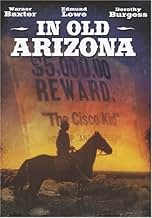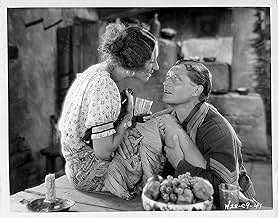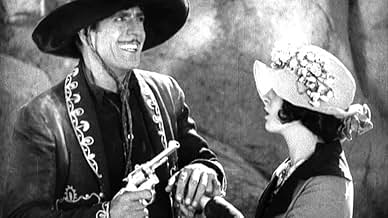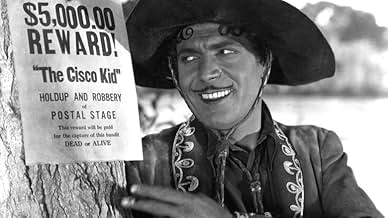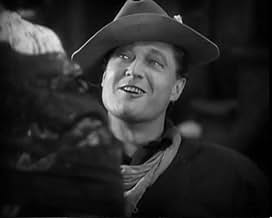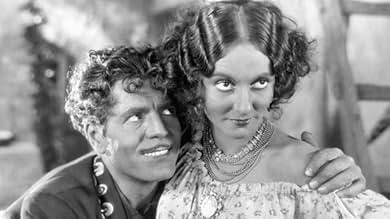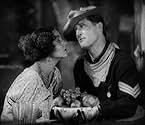IMDb-BEWERTUNG
5,5/10
1440
IHRE BEWERTUNG
Füge eine Handlung in deiner Sprache hinzuA charming, happy-go-lucky bandit in old Arizona plays cat-and-mouse with the sheriff trying to catch him while he romances a local beauty.A charming, happy-go-lucky bandit in old Arizona plays cat-and-mouse with the sheriff trying to catch him while he romances a local beauty.A charming, happy-go-lucky bandit in old Arizona plays cat-and-mouse with the sheriff trying to catch him while he romances a local beauty.
- 1 Oscar gewonnen
- 4 Gewinne & 4 Nominierungen insgesamt
Henry Armetta
- Barber
- (Nicht genannt)
James Bradbury Jr.
- Soldier
- (Nicht genannt)
Frank Campeau
- Man Chasing Cisco
- (Nicht genannt)
John Webb Dillion
- Second Soldier
- (Nicht genannt)
Alphonse Ethier
- Sheriff
- (Nicht genannt)
Jim Farley
- Townsman
- (Nicht genannt)
William Gillis
- Guard
- (Nicht genannt)
Pat Hartigan
- Cowpuncher
- (Nicht genannt)
Soledad Jiménez
- Tonita the Cook
- (Nicht genannt)
Ivan Linow
- Russian Immigrant
- (Nicht genannt)
Tom London
- Man in Saloon
- (Nicht genannt)
Helen Lynch
- Stagecoach Passenger
- (Nicht genannt)
J. Farrell MacDonald
- Stage Passenger
- (Nicht genannt)
Julius Viggo Madsen
- Tenor in Quartet
- (Nicht genannt)
Empfohlene Bewertungen
Although this film was released in January 1929, it was filmed in 1928. That makes it truly amazing when you think that the first all-talking picture wasn't even released until July 1928 - "Lights of New York". As others have mentioned, this film does not have lots of action - much screen time is spent with characters just talking in specific locations. There are no exciting shoot-outs or chases as you would expect in a western made just five years later. This is probably due to the motion constraint of the early sound cameras. However, you do get some tremendous long shots of some stunning western vistas. This was because Fox was an early adopter of sound-on-film versus sound-on-disc. This gave Fox the ability to shoot outside and made the studio an innovator in the production of newsreels - they could take their cameras anywhere.
As for the film itself, I'd recommend it only if you're interested in early sound films. Otherwise, you'll probably be bored stiff due to the lack of action. Warner Baxter's portrayal of the Cisco Kid is quite good. He doesn't get too campy with a role that could have been over-the-top in the wrong hands. I do have to wonder - why is every single member of the army that is pursuing Cisco speaking with a Queens accent and why are they using urban New York slang? Was there a mix-up at central casting that day? Was the cast of this film supposed to show up for a Bowery Boys film or a gangster picture and wound up here by mistake? In 1928 there were dialogue coaches, but probably not many coaches on regional dialect. It's a shame to think that if John Wayne had tried out for this early sound western he would have been turned down because he didn't sound like he was from Brooklyn.
As for the film itself, I'd recommend it only if you're interested in early sound films. Otherwise, you'll probably be bored stiff due to the lack of action. Warner Baxter's portrayal of the Cisco Kid is quite good. He doesn't get too campy with a role that could have been over-the-top in the wrong hands. I do have to wonder - why is every single member of the army that is pursuing Cisco speaking with a Queens accent and why are they using urban New York slang? Was there a mix-up at central casting that day? Was the cast of this film supposed to show up for a Bowery Boys film or a gangster picture and wound up here by mistake? In 1928 there were dialogue coaches, but probably not many coaches on regional dialect. It's a shame to think that if John Wayne had tried out for this early sound western he would have been turned down because he didn't sound like he was from Brooklyn.
In Old Arizona made for Fox Films in 1928 has the distinction of being the first all sound film and by dint of that the first all sound western. Warner Baxter won the second Academy Award given out for Best Actor and In Old Arizona bringing to the screen that legendary Robin Hood of the West, The Cisco Kid.
This version of Cisco is a whole lot different than the show I remember as a lad. Duncan Renaldo was a gentlemen, a caballero in the full meaning of the word, ever ready to help anyone in distress. He was a Latino version of Hopalong Cassidy and Cisco and Hoppy had a revival of popularity in the early television days.
But both of those characters were far from what Clarence Mulford and William Sydney Porter wrote. Hoppy was a tobacco chewing rather profane cuss who worked on the Bar 20 ranch, not the kid's role model William Boyd made him. Similarly the Cisco Kid was a charming fellow even for a bandit. But he was a most unapologetic man about his profession.
For this film Baxter's Cisco is cleaned up somewhat, still though he exacts a terrible, but quite just vengeance for betrayal, something Duncan Renaldo never would have done.
Today with political correctness, a man like Warner Baxter never would have been cast as the Cisco Kid, let alone win an Oscar for the role. But Baxter went on to do Cisco in four more films before folks like Cesar Romero, Gilbert Roland and Duncan Renaldo took the character over. There's a reason for this, Warner Baxter did a superb job in the part. Though his accent is obviously fake, he in no way demeans Latinos with his portrayal.
Dorothy Burgess is Cisco's best girl, I say best because she's far from the only one. She's a girl with big ambitions though and a bandit's moll even for a guy as handsome and charming as Warner Baxter has its limits.
Cisco's reeking so much havoc in that country on the American side of the Rio Grande that the army has gotten into the act. With war with Spain imminent, Sergeant Edmund Lowe's been given an order, get Cisco dead or alive.
Lowe essentially brings his Sergeant Quirt persona to the part of New York born sergeant Mickey Dunn. He's about an inch too sure of himself and he too thinks he's best with the ladies.
In Old Arizona also got nominations for Best Picture, Best Director and it goes without saying Best Sound. Though it's ancient now, a lot of people thought the sound of those ham and eggs cooking on the stove for Cisco in Burgess's cabin was considered revolutionary in 1928.
I recommend it highly especially for the ending. As another Latino icon was fond of saying, someone had a lot of explaining to do.
This version of Cisco is a whole lot different than the show I remember as a lad. Duncan Renaldo was a gentlemen, a caballero in the full meaning of the word, ever ready to help anyone in distress. He was a Latino version of Hopalong Cassidy and Cisco and Hoppy had a revival of popularity in the early television days.
But both of those characters were far from what Clarence Mulford and William Sydney Porter wrote. Hoppy was a tobacco chewing rather profane cuss who worked on the Bar 20 ranch, not the kid's role model William Boyd made him. Similarly the Cisco Kid was a charming fellow even for a bandit. But he was a most unapologetic man about his profession.
For this film Baxter's Cisco is cleaned up somewhat, still though he exacts a terrible, but quite just vengeance for betrayal, something Duncan Renaldo never would have done.
Today with political correctness, a man like Warner Baxter never would have been cast as the Cisco Kid, let alone win an Oscar for the role. But Baxter went on to do Cisco in four more films before folks like Cesar Romero, Gilbert Roland and Duncan Renaldo took the character over. There's a reason for this, Warner Baxter did a superb job in the part. Though his accent is obviously fake, he in no way demeans Latinos with his portrayal.
Dorothy Burgess is Cisco's best girl, I say best because she's far from the only one. She's a girl with big ambitions though and a bandit's moll even for a guy as handsome and charming as Warner Baxter has its limits.
Cisco's reeking so much havoc in that country on the American side of the Rio Grande that the army has gotten into the act. With war with Spain imminent, Sergeant Edmund Lowe's been given an order, get Cisco dead or alive.
Lowe essentially brings his Sergeant Quirt persona to the part of New York born sergeant Mickey Dunn. He's about an inch too sure of himself and he too thinks he's best with the ladies.
In Old Arizona also got nominations for Best Picture, Best Director and it goes without saying Best Sound. Though it's ancient now, a lot of people thought the sound of those ham and eggs cooking on the stove for Cisco in Burgess's cabin was considered revolutionary in 1928.
I recommend it highly especially for the ending. As another Latino icon was fond of saying, someone had a lot of explaining to do.
It was so enjoyable going way back in time to the Year 1928 and view Warner Baxter,(The Cisco Kid) who played his role the way I would want to see an actor portray The Cisco Kid. Dorothy Burgess, (Tonia Maria) is the girl friend of Cisco Kid and gives a great supporting role as a gold digger who wants plenty of gold, romance and any man who desires her charm. Edmund Lowe, (Sergeant Mickey Dunn) plays a soldier who is hunting down the Cisco Kid and gets himself involved with Tonia Maria in order to set up a trap to catch the Cisco Kid. Sgt.Mickey Dunn is from New York and talks and sings about the Bowery and brags about the cost of a beer for only five (5) cents and all the food you can eat. It is nice to know that Warner Baxter won an Oscar for his performance as the Cisco Kid, who was also the star of many "Crime Doctor" films as Dr. Ordway. This is a great classic film that you will not want to miss from 1928 and also has sound for the voices. Enjoy
This film has been of interest to me for some time now, for a number of reasons. I finally managed to get a copy and saw it yesterday. I now understand why it is not currently generally available-it is dated, of, at best, average quality, not without charm or appeal, to be sure, but the interst here is for a relatively small audience. Not a bad film, by any means, just not terribly engaging. I will say that a knowledge of Spanish greatly enhanced my own enjoyment of this film, as two or three very good lines were delivered in Spanish.
I have now seen three of the five Academy Award Picture nominees in their entirety (and am unlikely to ever see one, The Patriot, as it is reportedly a "lost" film) and part of Alibi. I now understand how Broadway Melody won that year. Of the choices I've seen, it is clearly the best of an average lot. The Patriot may well be better, but I'm unlikely to ever be able to judge that point.
I enjoyed the film, warts and all, but it is rather dated. But, for my money, any movie that gives the leading man the nickname, "El Conejito" (Little Rabbit) can't be too bad. Worth watching. Recommended to old film buffs and film historians.
I have now seen three of the five Academy Award Picture nominees in their entirety (and am unlikely to ever see one, The Patriot, as it is reportedly a "lost" film) and part of Alibi. I now understand how Broadway Melody won that year. Of the choices I've seen, it is clearly the best of an average lot. The Patriot may well be better, but I'm unlikely to ever be able to judge that point.
I enjoyed the film, warts and all, but it is rather dated. But, for my money, any movie that gives the leading man the nickname, "El Conejito" (Little Rabbit) can't be too bad. Worth watching. Recommended to old film buffs and film historians.
This is likely the first sound western film as well as the first sound film done out-of-doors. Suggested by "The Caballero's Way", a short story by William Sidney Porter (O.Henry), the main character, "The Cisco Kid", has been considerably upgraded. Porter's "Kid" was a ruthless bandit who didn't like people who got in his way, especially sheriffs. When a sheriff seduced the "Kid's" girl-friend into betraying him into an ambush, the "Kid", ruthlessly clever, took his revenge in a sadistic fashion. In case one might want to read the story, I will say no more. In the film, the "Kid" is a bandit right enough, but a sympathetic one, and sufficiently clever to outwit a sheriff who persuades the girlfriend to disarm the "Kid". She does this by charming him into taking off his gun when he meets her for a tryst. Don't worry, the "Kid" is one up on this trick, too, but protects himself in somewhat gentler fashion than in the story. If one could view this film today it would seem a museum piece, but not without some pictorial charm. I remember the photography as very pictorial, as with some later sequels, and there is a scene of bacon frying over a campfire that rather startled 1929 film goers with the realistic sound.
Wusstest du schon
- WissenswertesThe first all-talking, sound-on-film feature shot outdoors.
- PatzerWhen Cisco robs the stagecoach, he is wearing an army holster (flap-over), the same type the Sergeant wears. But for the rest of the movie, he wears an open holster.
- Zitate
[last lines]
The Cisco Kid: Her flirting days are over. And she's ready to settle down.
- VerbindungenFeatured in The Soundman (1950)
- SoundtracksMy Tonia
Words and Music by Buddy G. DeSylva (as DeSylva), Lew Brown (as Brown) and Ray Henderson (as Henderson)
Sung by Warner Baxter (uncredited)
Top-Auswahl
Melde dich zum Bewerten an und greife auf die Watchlist für personalisierte Empfehlungen zu.
- How long is In Old Arizona?Powered by Alexa
Details
- Erscheinungsdatum
- Herkunftsland
- Sprachen
- Auch bekannt als
- The Cisco Kid
- Drehorte
- San Fernando Valley, Los Angeles, Kalifornien, USA(outdoor riding)
- Produktionsfirma
- Weitere beteiligte Unternehmen bei IMDbPro anzeigen
Box Office
- Bruttoertrag in den USA und Kanada
- 2.834.000 $
- Laufzeit
- 1 Std. 35 Min.(95 min)
- Farbe
Zu dieser Seite beitragen
Bearbeitung vorschlagen oder fehlenden Inhalt hinzufügen

